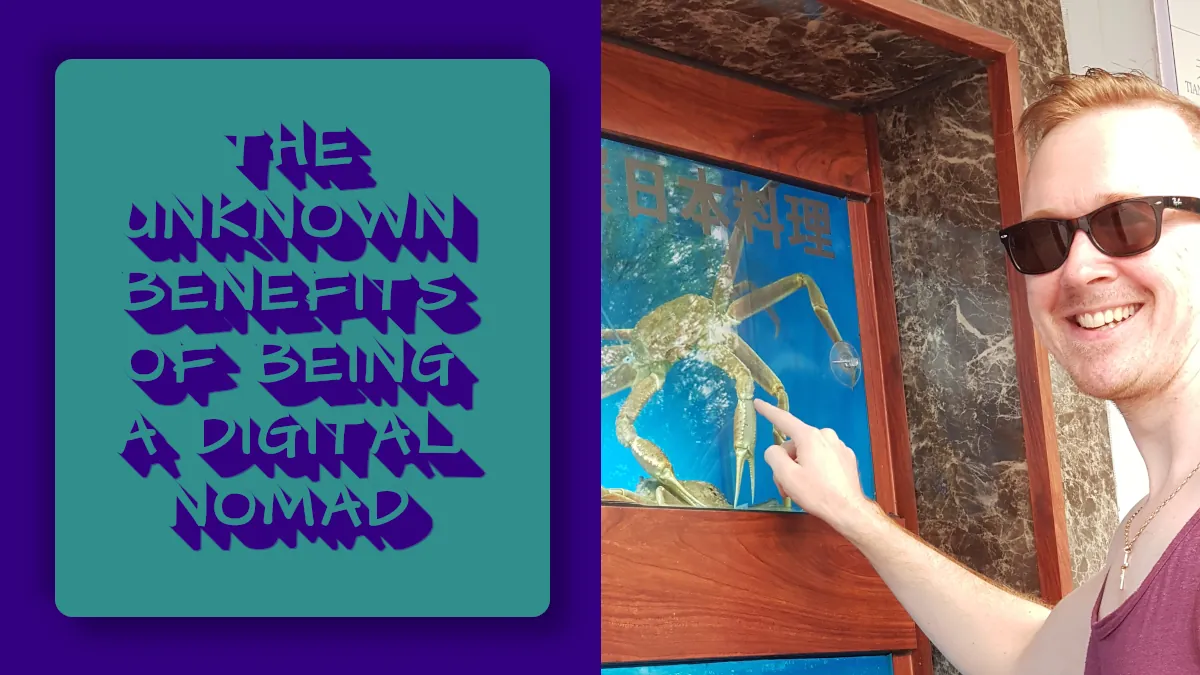Updated July 2025
I will always remember the hum of my laptop mixing with the pre-dawn street sounds of Tianjin. That was my entry into this life, over fifteen years ago. Since then, the “digital nomad” lifestyle has exploded, but the fundamental question remains the same: how do you actually make it work?
Forget the glossy Instagram posts for a moment. This life is built on the bedrock of real work. I’ve met hundreds of nomads across Asia, from developers in the tech hub of Chiang Mai to writers seeking inspiration in the quiet cafes of Luang Prabang. I’ve seen what works, what doesn’t, and what the job titles really mean on the ground.
This isn’t just another list. This is a compendium of proven paths, filled with the ground truth I’ve gathered over a decade and a half. It’s a realistic guide to the digital nomad jobs that can fund a life of freedom and intentional travel.
Before You Pack Your Bags: Preparing for a Life of Freedom
A successful leap into the nomadic life is a matter of strategy, not impulse.
- Start with Your Current Job: The lowest-risk path is to convert the job you already have. Before looking elsewhere, have an honest conversation with your boss. Frame your desire to work remotely as a benefit to the company—a focused, dedicated employee, unburdened by a commute.
- Build Your Bridge with a Side Gig: Don’t jump from the cliff; build a bridge. Starting your desired nomad job as a side hustle is the smartest way to begin. It allows you to test the waters, build a client base, and confirm it’s a viable option before you sever your primary source of income.
- Always Be Prepared: Opportunity arises in the most unexpected places. Your readiness is key. Maintain a personal website or a sharp, up-to-date LinkedIn profile showcasing your projects. Your online presence is your digital sword and shield; keep it polished and ready.
14 Digital Nomad Jobs You Could Start Today
1. Freelance Writer
The quintessential nomad job, and for good reason: all you truly need is a laptop and a command of language. The reality, however, is that the market is incredibly crowded. You need to prove why you’re better than just using A.I. I’ve seen many aspiring writers fizzle out because they tried to be generalists. The ones who succeed find a specific, profitable niche—like finance, SaaS, or health and wellness—and become the go-to expert.
Your first step isn’t just to write, but to build a portfolio that proves your expertise. Offer to write a few free guest posts for respected blogs in your chosen niche. This act of providing value upfront is the fastest way to land paying clients on platforms like Upwork. A tool like Grammarly Premium (or ChatGPT/Gemini) is a non-negotiable business expense.
- Average income of around $27.88 per hour.
2. Graphic Designer
Walk into any co-working space from Bali to Berlin, and you’ll find a corner filled with graphic designers. Design is the visual language of the internet, and fluency pays well. While AI can generate images, a true designer understands strategy, branding, and the human element—a skill set that remains in high demand.
- Your journey begins with mastering the tools of the trade, primarily the Adobe Creative Suite.
Before you seek paid work, build your portfolio on a platform like Behance. A smart move is to offer a branding package to a local café or non-profit; this gives you a real-world case study that’s worth more than any student project.
- The average salary for a graphic designer is about $54,772 per year.
3. Social Media Manager
This role is far more than just “posting online.” I built a crumpet business online during Covid which thrived because of sharp social media managing and understanding the local market. You are the voice of a brand, a strategist, and an analyst all in one.
To start, don’t try to master all platforms. Pick one—like Instagram or LinkedIn—and go deep. Understand its algorithm and culture inside and out. Offer to manage the social media for a small business or a friend’s project for a trial period to build a results-driven portfolio. Free courses from HubSpot Academy can also provide a valuable credential.
- Social media managers can expect to earn an average of $58,074 per year.
4. Photo / Video Editor
Here’s something most people don’t realize: a lot of big-name creators don’t edit their own stuff. They shoot the content, they’re great on camera — but when it comes to stitching it together, adding sound, motion, polish… they outsource. Because editing is time-consuming. And that is your opportunity.
If you’re fast, reliable, and know your way around editing tools, you can absolutely build a remote income stream by supporting creators behind the scenes.
The usual go-to tools are:
- DaVinci Resolve – professional-grade and free
- Adobe Premiere Pro – industry standard, subscription-based
But there are powerful FOSS (free and open-source software) options worth learning too:
- Darktable – for photo editing (alternative to Lightroom)
- GIMP – for graphics and thumbnails (Photoshop alternative)
- Blender – 3D graphics, animation, even video editing (seriously underrated)
Start by editing your own footage — travel clips, daily vlogs, or short reels. Or offer a free edit to a smaller creator whose style you love. That gives you a portfolio and a potential testimonial.
When you’re ready to find paid gigs, look on:
- Fiverr
- Upwork
- Reddit subs like r/ForHire or r/EditorsForHire
- Or even directly DM creators on Instagram, TikTok, or YouTube
In this game, speed and reliability are just as important as style. Deliver clean edits fast, and word gets around.
Video editors earn, on average, $55,165 per year.
5. Transcriber
This is one of the most straightforward remote jobs available.
If you have a keen ear and can type quickly and accurately, you can find work. While AI tools are handling simple tasks, human transcribers are still essential for complex audio with multiple speakers, strong accents, or technical jargon, especially in the legal and medical fields. To get started, you’ll need a good pair of noise-canceling headphones.
The average salary is around $51,686 per year.
6. Programmer / Developer
As a coder myself, I can confirm this is one of the most lucrative and flexible paths. The language you know matters less than your ability to solve problems logically. You can work freelance or find a full-time remote role. A crucial part of your workflow will be platforms like GitHub, which acts as your global office for version control and collaboration.
Your first step is to choose a specialty, like front-end web development, and build 2-3 small but polished projects that you can showcase. Contributing to an open-source project is also a fantastic way to gain experience and get noticed.
Average Salary: $86,724 per year.
7. Tech Support Specialist
You don’t need to be a developer. You don’t need a computer science degree. What you do need is patience, decent communication skills, and the ability to Google like a professional.
Tech support — especially Tier 1 help desk work — is a solid entry point into remote work. It’s all about solving problems, walking people through fixes, and keeping systems running smoothly. And once you’re in, it opens doors to better-paying roles over time.
If you’ve ever done customer service, IT support, or anything troubleshooting-related, that’s your angle. Update your CV and start searching for:
- “Remote IT Help Desk”
- “Remote Technical Support”
- “Customer Support (SaaS)”
Search on LinkedIn, We Work Remotely, and Indeed.
To stand out, get familiar with tools like:
Most companies will train you on the specifics, but showing that you know the basics gives you a huge edge.
The average salary is about $52,198 per year.
8. SEO Strategist
The city of Chiang Mai in Thailand famously became a global hub for SEO professionals, and for good reason. It’s a perfect remote-first career that blends analytics, strategy, and creativity.
True success in SEO comes from a deep, analytical understanding of how search engines work and a focus on creating genuine value, not just trying to trick the algorithm. To begin, immerse yourself in the teachings of reputable sources like Backlinko. The best way to learn is by doing: start your own small niche website and use it as a laboratory to test strategies and track results.
An SEO strategist can expect to earn around $64,887 per year.
9. Blogger / Niche Site Owner
Blogging still works — and it’s one of the easiest ways to build a location-independent income. You don’t need a huge audience, and you don’t need to quit your job to start. What you do need is a simple setup and the discipline to keep going.
Here’s exactly how to start:
- Get hosting through BigScoots – they’re fast, reliable, and their support team will help you set everything up.
- Use WordPress. BigScoots will install it for you. It’s the gold standard — skip the drag-and-drop builders.
- Pick a clean theme. Don’t overthink it. Use a minimalist, fast-loading one like Kadence or GeneratePress.
- Start writing. Focus on solving problems or answering questions people actually search for.
- Monetize. Once you’ve got traffic, add affiliate links, digital products, or offer services.
Don’t waste time choosing between platforms, tools, or perfect logos. Just start. Your first 30 posts will teach you more than any course.
A blog is a long-term game. It won’t explode overnight — but it will build. If you’re consistent, it can become one of the most valuable assets you own.
The average salary for professional bloggers is $57,639 per year, but this varies wildly.
10. Virtual Assistant (VA)
I’ve worked with virtual assistants over the years, and the ones who actually become indispensable aren’t the ones ticking boxes — they’re the ones quietly running the show. They anticipate needs, smooth out chaos, and often know what’s coming before you do. It’s less “assistant,” more “remote operations manager.”
If you’re organized, detail-driven, and a strong communicator, this can be a stable, well-paying remote career. The work ranges from inbox management and calendar control to coordinating teams and handling client communications. It all depends on your skill set — and your initiative.
Start simple: write down your five strongest admin or operational strengths. Turn that into a one-page PDF or landing page that clearly states what you offer and who it’s for. Keep it clean, professional, and confidence-forward.
Most people land their first clients through their existing network — old colleagues, friends launching businesses, or solo founders who are overwhelmed. Don’t wait for a job post. Reach out directly.
When you’re ready to branch out, here are some solid platforms to find remote assistant roles:
- Upwork – Competitive, but good for starting out and finding niche gigs
- Belay – Focused on matching VAs with U.S.-based executives and entrepreneurs
- Boldly – Premium assistant services with long-term placements
- Time Etc – Focused on flexible part-time assistant work
- We Work Remotely – Occasionally lists virtual operations roles with startups and tech companies
Being a VA isn’t about being on call — it’s about being reliable. And in today’s remote-first world, that kind of reliability travels far.
The average salary is approximately $47,931 per year.
11. Self-Published Author
Publishing a book used to be a black box — now it’s wide open. With tools like Amazon KDP, anyone can publish and sell their writing globally in a matter of days. But here’s the part most people miss: being an author today means being your own marketing department too.
The indie authors who actually make money aren’t always the best writers — they’re the ones who keep publishing. One book rarely changes your life, but five, ten, fifteen? That’s a catalogue. That’s momentum. That’s what gets you noticed in search and recommended by algorithms.
If you’re starting from zero, forget all the strategy for now. Just focus on building the habit. A thousand words a day is enough. Finish the first book. Then the second. Don’t stop.
Income varies wildly — some authors earn coffee money, others pull in six figures. It all comes down to volume, niche, and how well you can connect with the people you’re writing for.
12. Online Fitness / Wellness Coach
I’ve been teaching martial arts for years, and what’s surprised me most recently is how fast the online fitness world has grown — not just for influencers, but for actual teachers. You don’t need a huge audience. You just need a clear offering and a consistent way to connect with people.
The truth is, the real value isn’t in going viral — it’s in building a small, engaged group of students who show up to your classes every week. That can work for nearly any movement discipline:
- Yoga
- Tai Chi
- Martial Arts
- Strength Training
- Mobility
- Qigong
- HIIT
Getting certified in your field helps, especially when you’re just starting. It gives people a reason to trust you. From there, you’ll want to figure out how you’ll deliver your sessions — Zoom is great for live classes, but platforms like Trainerize, TrueCoach, or Trainiac make it easy to run ongoing programs or hybrid coaching setups.
The mistake a lot of people make is waiting until everything’s perfect. A polished website, professional videos, complicated systems. But in most cases, all you need is a way to show up consistently and deliver real value. That’s what makes clients stick around — not fancy branding.
An online personal trainer earns, on average, $56,584 per year.
13. Online Teacher / Tutor
Online learning has gone fully mainstream, and with it, the demand for qualified tutors has exploded. If you’ve got a degree or strong subject expertise — especially in academic areas like math, science, or writing — you can often charge more than standard English teachers.
If you’re planning to teach English, a TEFL certificate is still the go-to credential. Most platforms expect it, and it makes getting approved much easier.
To get started:
- Gather your credentials. Academic transcripts, degrees, teaching experience — anything that builds trust.
- Create strong profiles on platforms like iTalki, Preply, or Tutor.com. Take the time to write a clear bio and record a short intro video.
- Use a reliable setup. A high-speed internet connection, a decent mic, and a quiet space are essential.
Once you’re live on a few platforms, consistency and reviews will do a lot of the work for you. Good tutors get booked — fast.
The average online tutor earns around $47,794 per year.
14. Consultant
I worked as a consultant for years in Beijing — mostly in career/business coaching and strategic planning. The sessions were all online, which turned out to be a game-changer. It meant I could travel freely across Asia, working from cafes in Phuket, co-working spaces in Bali, and guesthouses in Laos. The work didn’t stop, and neither did the income.
Consulting is one of the highest-paying paths for experienced professionals — especially if you’ve got a solid background in something like marketing, finance, or tech. You’re not just charging for your time, you’re offering insight, strategy, clarity.
If you’re considering this route, here are a few things that helped me get started:
- Narrow your niche. Be specific about what problem you solve and for whom. Broad titles like “business consultant” won’t stand out.
- Leverage your past. Use your existing career as proof — highlight real results, projects, or outcomes you’ve delivered.
- Build a basic site. It doesn’t need to be fancy. A clean homepage, a short “about” section, and 2–3 case studies or testimonials are enough.
- Start with your network. Most first clients come from people who already know you. Reach out quietly and directly — no need for big announcements.
- Keep it remote-first. Structure your services so they can be delivered via Zoom, email, or async tools like Loom — that’s what gives you freedom.
The average salary for a management consultant is around $86,076 per year.
The Work Before the Freedom
There has never been a better time to design a life of freedom and travel. The tools are available, and the opportunities for remote work are abundant.
But this lifestyle is not an escape from work; it’s an invitation to integrate your work more deeply and intentionally into your life. Each of these digital nomad jobs requires discipline, professionalism, and a commitment to providing real value. The freedom is the reward for that work.
Choose a path that excites you, start with one small step, and begin the journey.








